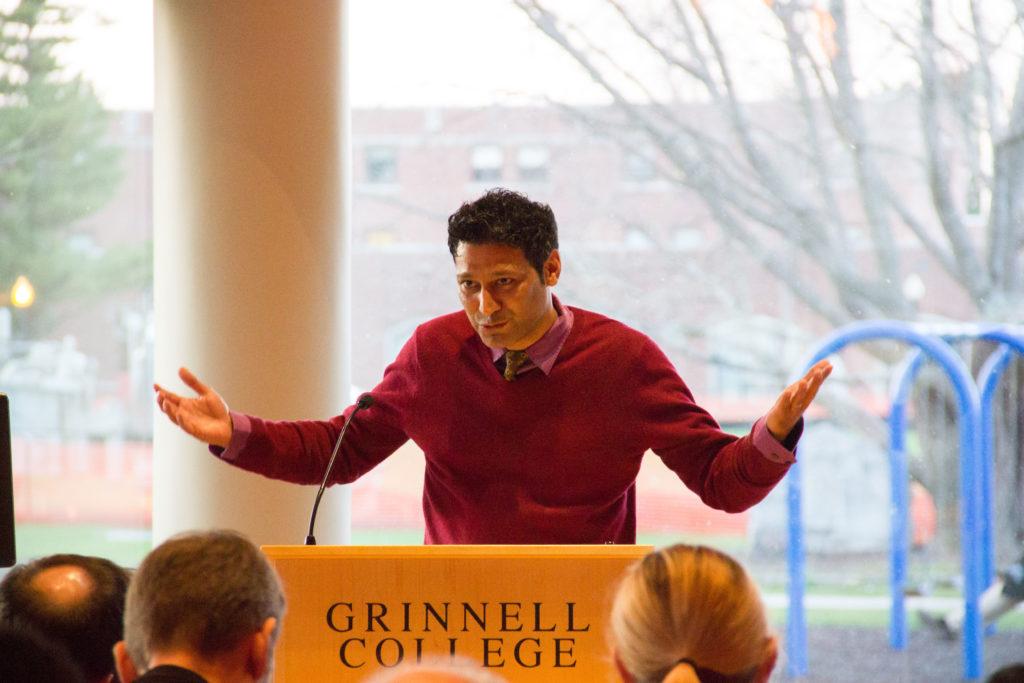
Khurram Hussein, a professor of religious studies at Lehigh University, came to Grinnell on April 11 to deliver a lecture entitled called “Can the Muslim Speak?” He proposed that discussion of Muslim identity should not be restricted, moving from one end of the simplistic ‘good/bad’ dichotomy to the other. Hussein discussed the fact that Muslims and other marginalized groups are shoehorned into existing under one identity, but he worked throughout the talk to discuss this in a way audiences could understand.
Hussein’s universal reach was evident before he began his speech. Caleb Elfenbein, religious studies, who specializes in Islam and Middle Eastern History, introduced Hussein. Elfenbein shared an anecdote from when he and Hussein met long before the talk. It was at an academic conference and they read each other’s research. Elfenbein, after reading Hussein’s paper, shared that he felt as though “[he] had written to me.” Hussein humorously injected, “Not really.” One could find this type of sarcastic humor permeating his speech as well.
Hussein began his lecture with a purposely inflammatory statement. “In the immediate aftermath of the events of 9/11 Muslims everywhere were possessed by a strange jubilation.”
He went on to discuss various Muslim groups who supported the attacks and opposed American values — he said that Muslims in Beirut and East Jerusalem rejoiced at the events of 9/11.
Given his sarcastic sense of humor and the conspicuous absurdity of the statement — surely, few Muslims could take pleasure in terrorist attacks — it seemed as though Hussein was building towards a sarcastic joke.
Instead of delivering the punchline, he asked a sobering question “Was Islam hijacked by extremists or were Muslims themselves in the grip of an evil ideology?”
To the chagrin of the audience, he continued to share negative portrayals of Islam, reading a passage from the popular novel “The Reluctant Fundamentalist,” in which the main character, a young Muslim man, becomes disillusioned with America and surprisingly finds himself taking pleasure in the events of 9/11. All of this suggested a defense for negative views of Islam.
Yet he immediately countered his previous case defending negative views of Islam by quoting an unlikely figure, George Bush. He quoted a line from the speech Bush gave immediately after 9/11, that “Islam is a religion of peace.”
As Hussein brings up, Bush in this speech upholds that Muslims are Americans. Their coexistence is not a contradiction, although many today would argue otherwise.
“Empathy comes with a price,” he said.
Hussein went on to talk about the kind of empathy that unconditionally demands believing in the good of the group. “[Muslims] must profess [their] professed peace.”
At the crux of his speech, Hussein brought together common dialogue surrounding Muslim identity, including the loaded phrases “religion of peace” and “religion of violence.” Hussein himself took the word “peace” to task. As a Muslim, he shared that he disliked the idea of Islam being called a “religion of peace.” He borrowed from Gandhi, who persistently affirmed that he was not a “man of peace,” but rather a “man of action.”
By presenting popular portrayals that force Muslims to exist in a space where they are either good or bad, Hussein elucidated the constraints placed on Muslim identity. At the end of his speech, he asked the audience to avoid the “either/or” dichotomy. His speech, constructed to dissuade the audience from siding with either end of this spectrum, provides an outline for engaging with others in a way that will elevate discussions of Muslim identity.



























































